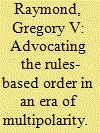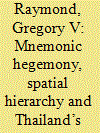|
|
|
Sort Order |
|
|
|
Items / Page
|
|
|
|
|
|
|
| Srl | Item |
| 1 |
ID:
165209


|
|
|
|
|
| Summary/Abstract |
Faced with eroding United States hegemony and the rise of a more multipolar distribution of global power, Australia has embraced a new foreign policy platform built around advocacy for a ‘rules-based global order’. In this essay I first argue that the emerging characterisation of multipolarity overemphasises the centrality of the United States and overlooks the legacies of Asian colonisation, decolonisation, state-building and local norm development. I then consider the reasons for the embrace of the rules-based global order construct, locating it as an instinctive reaction to issues arising from the South China Sea dispute, the raw use of power, and the inclination to share the ideas of a close ally. I note, however, that linking Australia closely with the United States approach to global rules has drawbacks, given the United States’ explicit attempts to reserve a right to use force outside the UN Charter. I suggest that Australia would be better served by clearly delineating a separation between its military alliance with a United States, a policy for worst-case scenarios, from its support for international law and institutions, which should form the mainstay and leading edge of its foreign policy.
|
|
|
|
|
|
|
|
|
|
|
|
|
|
|
|
| 2 |
ID:
159802


|
|
|
|
|
| Summary/Abstract |
Commemoration of the Second World War in Southeast Asia varies significantly, from countries that have chosen to use the memory of Japanese occupation as a means of strengthening national unity, to those that pay little attention because doing so would distract from their own independence struggle. Thailand is one of those countries that downplays its official memory of the Second World War. This article investigates why, given that the Second World War saw significant loss of life and damage to Thai sovereignty, as well as acts of heroism, it occupies a marginal position in Thailand’s public memory. While Second World War history is not suppressed in history textbooks, Thailand’s Second World War monuments and commemorative ceremonies are either dispersed or disguised. To explain why this is the case, I examine firstly sensitivity to foreign perceptions, and secondly domestic politics in the aftermath of the Second World War. I argue that domestic politics offers a more convincing explanation, particularly with regard to the relatively obscure place of the Seri Thai resistance movement. Using the concept of mnemonic hegemony, and through analysis of the spatial distribution of Second World War monuments, I argue that Thailand’s Second World War history remains challenging and uncomfortable for Thailand’s dominant institutions, the monarchy and the military.
|
|
|
|
|
|
|
|
|
|
|
|
|
|
|
|
|
|
|
|
|